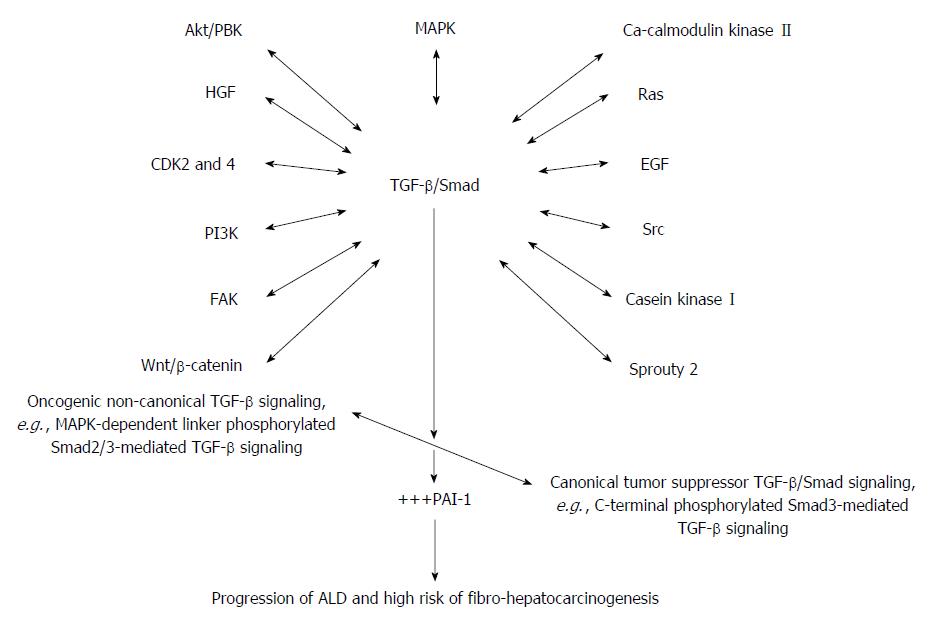Copyright
©The Author(s) 2016.
World J Gastroenterol. Jan 7, 2016; 22(1): 50-71
Published online Jan 7, 2016. doi: 10.3748/wjg.v22.i1.50
Published online Jan 7, 2016. doi: 10.3748/wjg.v22.i1.50
Figure 3 A proposed schematic illustration of the complex and integrative role of TGF-β/Smad signaling in alcoholic liver disease and alcohol-induced fibro-hepatocarcinogenesis.
Alcohol and its metabolic derivatives induce the release and activation of TGF-β/Smad signaling through NF-κB/TNF-α mediation (Figure 1). The NF-κB/TNF-α-mediated activation of TGF-β/Smad signaling switches canonical tumor suppressor (C-terminal phosphorylated Smad3/Smad4-dependent TGF-β signaling) into oncogenic (MAPK-dependent linker phosphorylated Smad2/3-dependent TGF-β signaling) and also non-canonical TGF-β signaling involving cross-signaling with other signaling pathways implicated in hepatic malignancies. Key cross-signaling pathways which team up with TGF-β signaling includes but not limited to CDK 2 and 4, Ca-calmodulin kinase II, EGF, HGF, PI3K/AKT, FAK, Src, Sprouty2, casein kinase I, Wnt/β-catenin. This leads to imbalance between canonical and non-canonical TGF-β signaling. Increase in oncogenic TGF-β/Smad signaling leads to up-regulation of PAI-1 gene expression and PAI-1-mediated pathologies thereof. The key pathological effects of PAI-1 include dysregulated ECM regulation, cell proliferation and invasion, and dysregulated apoptosis and these underlie initiation and progression of alcohol-induced fibro-hepatocarcinogenesis. HGF: Hepatocyte growth factor; ECM: Extracellular matrix; PAI: Plasminogen activator inhibitor; PI3K: Phosphatidylinositol 3-kinase; EGF: Epidermal growth factor; MAPK: Mitogen activated protein kinase; TGF-β: Transforming growth factor beta; Smad: Small mother against decapentaplegic; +++: Up-regulated expression or overproduction.
- Citation: Boye A, Zou YH, Yang Y. Metabolic derivatives of alcohol and the molecular culprits of fibro-hepatocarcinogenesis: Allies or enemies? World J Gastroenterol 2016; 22(1): 50-71
- URL: https://www.wjgnet.com/1007-9327/full/v22/i1/50.htm
- DOI: https://dx.doi.org/10.3748/wjg.v22.i1.50









